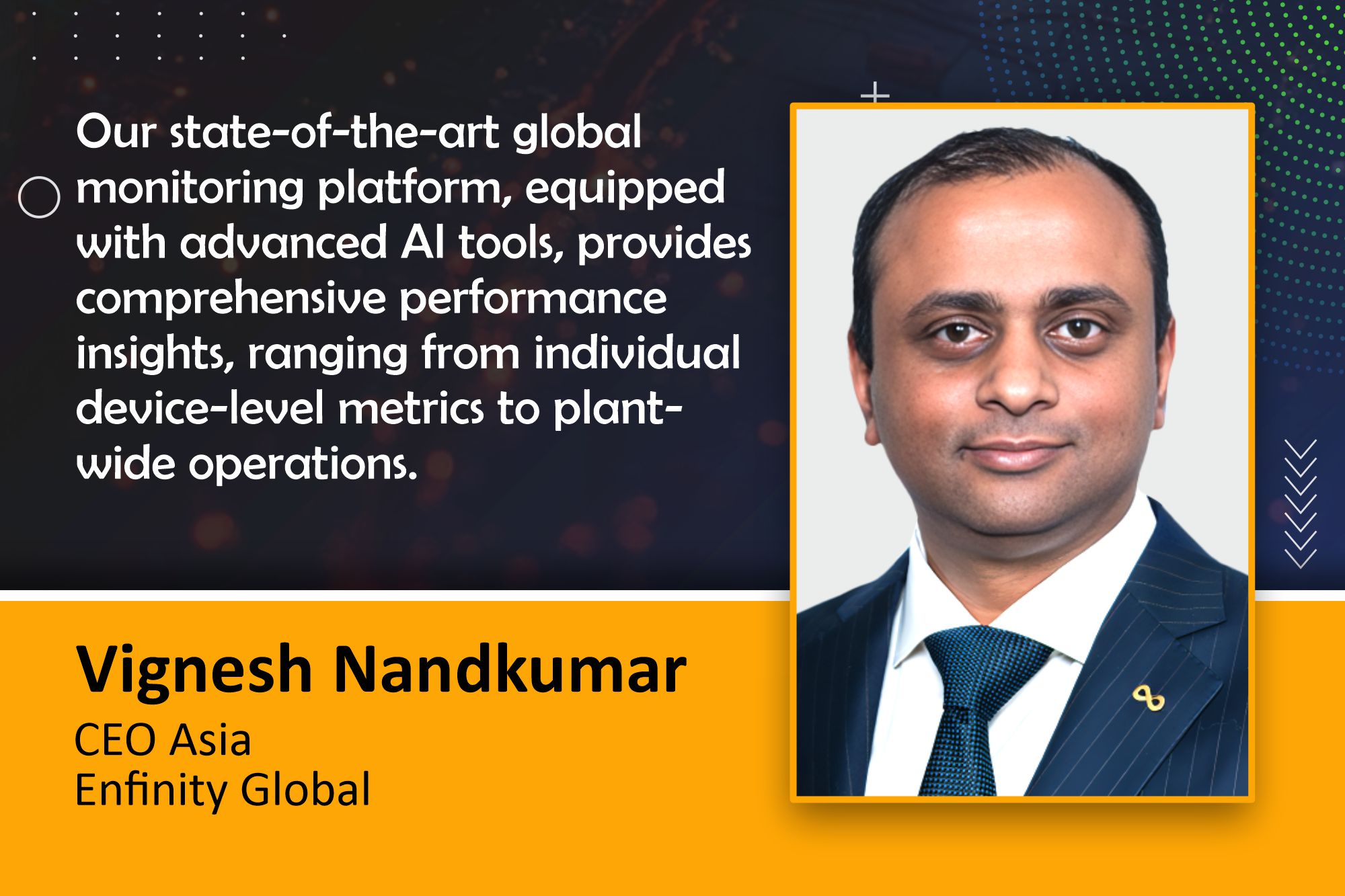Enfinity Global expands RE footprint with 1.5 GW solar pipeline in India
By EPR Magazine Editorial January 23, 2025 5:53 pm IST
By EPR Magazine Editorial January 23, 2025 5:53 pm IST

The company’s state-of-the-art global monitoring platform, equipped with advanced AI tools, provides comprehensive performance insights, ranging from individual device-level metrics to plant-wide operations.
The renewable energy market continues to evolve, offering significant opportunities for growth. Since its establishment in 2019, Enfinity Global has recognised India as a key market in its business strategy, leveraging the country’s strong support for renewables and the significant opportunities the country presents. The company operates 240 MW of solar projects across India and has invested in developing a 1.5 GW ready-to-deploy pipeline with secured land and connectivity. Vignesh Nandkumar, CEO of Asia of Enfinity Global, shares more insights into the industry.
How is Enfinity Global incorporating AI, IoT, and predictive analytics to enhance operational efficiency and reduce costs?
Our state-of-the-art global monitoring platform, equipped with advanced AI tools, provides comprehensive performance insights, ranging from individual device-level metrics to plant-wide operations. This sophisticated system simplifies the identification of low-performance areas and streamlines event management by analysing issues’ nature, frequency, and patterns through predictive analytics that are seamlessly integrated into the platform.
Additionally, we are advancing toward implementing cutting-edge Digital Twin technology. This innovative solution leverages AI to pinpoint fault areas with precise geographical coordinates while providing operators with detailed information about the affected equipment’s nature, type, and specifics.
How can governments ensure that bureaucratic delays and regulatory challenges do not hinder renewable energy projects?
To sustain the growth and unlock the full potential of renewable energy, it is essential to address bureaucratic delays and regulatory challenges, particularly in the closure of PPAs from tenders and approvals for final connections post-construction. Digitalising approval processes can be a transformative solution to these challenges. The government can streamline project approvals, ensure real-time monitoring, and enhance transparency by implementing centralised, user-friendly online platforms. Automated document verification and compliance tracking systems can significantly reduce processing times, enabling projects to move forward without unnecessary delays. This digital-first approach enhances efficiency and fosters confidence among investors and developers.
What challenges can be expected in the supply chain for renewable energy technologies?Geopolitical tensions and disruptions in international trade have impacted the supply of renewable energy components. Fortunately, the government addresses these challenges by strengthening local production capacities and exploring new trade partnerships.
At Enfinity Global, we remain vigilant and proactive in managing supply chain challenges. By anticipating our supply needs well in advance, we ensure seamless project execution. A testament to this approach is our 135 MW project in Maharashtra, completed ahead of schedule during the challenging times of COVID-19, showcasing our commitment to efficiency and resilience.
One critical area requiring further attention is the logistics of transporting large-scale renewable components, such as wind turbines and solar panels. Due to their size and complexity, these components often require specialised infrastructure. Enhancing the country’s logistics network to address the lack of adequate transport solutions is crucial for the smooth and timely deployment of renewable energy projects.
How will the upcoming Budget and ELECRAMA 2025 shape renewable energy, innovation, and industry advancements?
As we look ahead to Budget 2025, the government’s ongoing commitment to renewable energy adoption and green technology integration is expected to receive a significant boost. Strategic initiatives such as the National Green Hydrogen Mission and the expansion of solar energy reflect a focused effort to build a greener industrial economy. Key priorities will be encouraging eco-friendly collaborations, establishing energy-efficient factories, and adopting sustainable materials. We also hope the government reconsiders the GST rates on certain components to enable better pricing for long-term solar and wind project tariffs.
ELECRAMA has always been the largest gathering in the power sector, providing us with a unique opportunity to connect and share insights into the advancements that have shaped the industry over recent years. As part of our brand exercise this year, we are excited to participate as visitors, keen to stay abreast of the latest trends and innovations in energy transition, digitalisation, and supply chain management, all key focal points for 2025.
We use cookies to personalize your experience. By continuing to visit this website you agree to our Terms & Conditions, Privacy Policy and Cookie Policy.